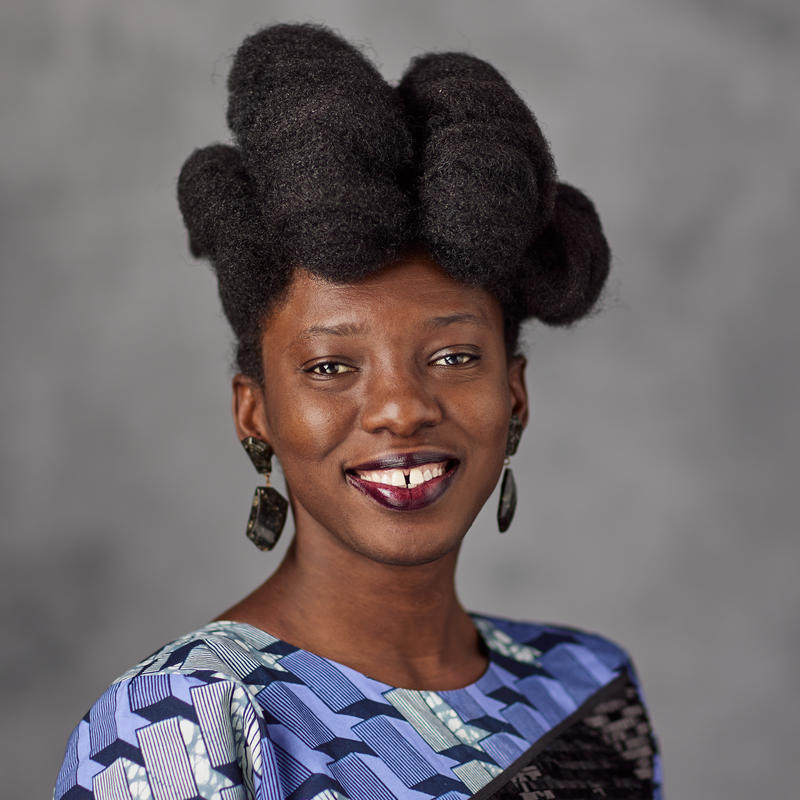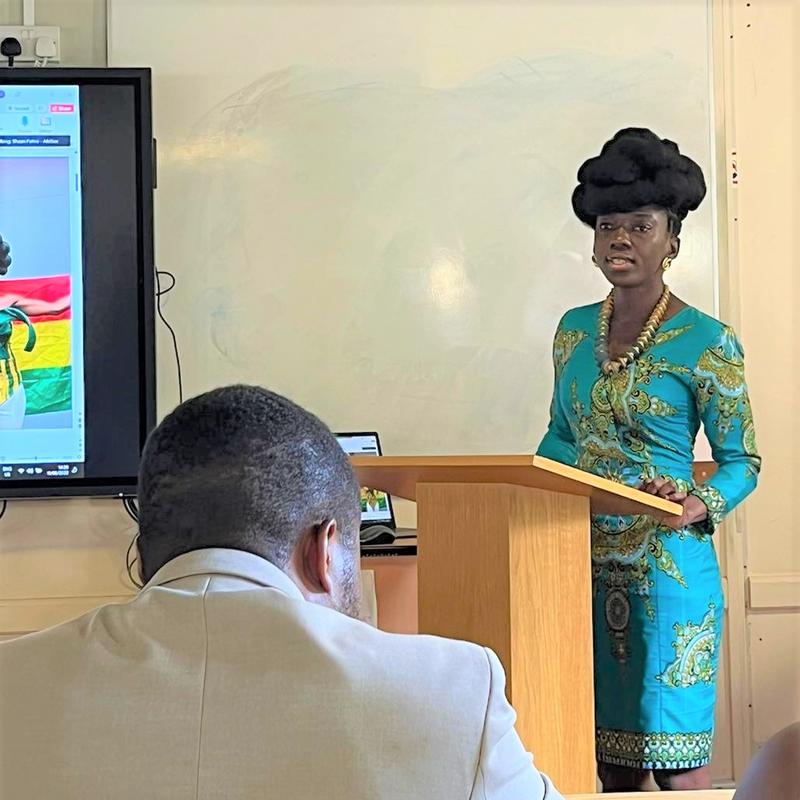DPhil Student Spotlight: Aboabea Akuffo
DPhil Student Spotlight: Aboabea Gertrude Akuffo
After studying Sociology and Philosophy at the University of Ghana, Aboabea joined the Sociology Department in 2018, under the supervision of Dr Heather Hamill. She is a member of Green Templeton College and is in receipt of a Commonwealth Scholarship.

Why Sociology?
I come from a Sociology background - both my Bachelor of Arts and MPhil degrees were in Sociology.
My interest in Sociology commenced with the desire to understand how structural factors such as policies and interventions influence individual behaviours at the micro-levels in society. Sociology was best fit to enable me to explore this interest.
What first attracted you to the Department of Sociology?
I was intrigued by the cutting-edge empirical research ongoing in the Department, and the range of methods that supported this research. The emphasis on rigorous methods resonated with me. I am a qualitative researcher and I employ emergent qualitative methods in my work. I knew the Department would be home to me.
In my search for a supervisor, I was thrilled that Dr Heather Hamill is also methodologically qualitative. She has ongoing research in some Global South countries including Ghana and the information I gathered was that she is incredibly patient.
Thus, the opportunity to be supervised by Dr Hamill and the opportunity to build on and train as a qualitative methodologist is what attracted me to the Department.
Where do your research interests lie?
The overriding themes in my research are education, gender, and family.
In my current research, I ask how we can make education access and distribution equitable in the Global South, using Ghana as an exemplar.
I address the challenges that governments face in expanding education access and distribution in the Global South. I have a particular interest in how low-resource countries create education policies and implementation approaches in response to global education priorities.
The goal is to show the interconnectedness of the hyper-local level education access policy discourses to the meaning-making that occurs at other levels where global education priorities are constructed.
Apart from this, it is challenging to isolate a couple of topics because I am also fascinated by political economy critique and feminist methodologies!
Has any of your research been published?
A reflection of my experience as a qualitative researcher or methodologist has recently been published in the Journal of Academic Ethics, titled “When the Researched Refused Confidentiality: Reflections from Fieldwork Experience in Ghana”.
My other paper “Who gets to go to school? Exploring the micro-politics of girls’ education in Ghana” has also been published in the International Journal of Qualitative Studies in Education.
Who is your academic hero?
I have two!
I admire Dr Heather Hamill, my DPhil Supervisor - she has played a transformative and critical role in my education.
Dr Hamill is the epitome that the transformation of education begins with teachers and academic supervisors. I appreciate her methodological specialty in qualitative methods and her flexibility in allowing students to adopt and adapt a searcher’s approach to the methodology they find useful.
Considering her supervisory approach, given any opportunity to teach, lecture and or supervise in future, I have the best example in her.
I also admire Professor Akosua Darkwah, my former MPhil supervisor. Her academic work, which centres structures of gender relations in the field of work, women’s work, and the structural economic process that shape women’s differentiated lives and opportunities, has generated new questions and interpretations of women’s lives, and provided pointers for policy reflections.
I also admire her devotion to women’s rights and activism at the ideational level, geared towards improving women’s access to institutional power needed to change their lives and enhance their political participation.
What have you enjoyed most about your course?
I enjoyed our Probationary Research Student Seminars where I had the opportunity to present and receive feedback and comments that shaped the initial stages of my research.
The weekly seminars also provided great opportunities to listen to incredible academics present their ground-breaking research.
I am also thankful for the DPhil professional workshops which explore diverse issues such as managing an academic career and publishing journal articles. These workshops were profoundly revealing in providing information that are necessary for building careers both academic and beyond.
What do you enjoy about living in Oxford?
I am awed by the diversity of people in Oxford and their humanity. This multicultural society presents a unique opportunity to meet, learn and interact with people from diverse backgrounds. I am also intrigued by the different cultural communities in Oxford.
This fascination with Oxford’s multicultural community propelled me to lead a forum that convened academics and students alike to explore multicultural society and the significance of fostering connections between cultural communities in Oxford.

What do you hope to do when you finish your course?
In the short term, I hope to find a postdoctoral position that will enable me to expand my work on inequitable education access and distribution in the Global South, emphasising education access in both collectivistic and relational terms in deciphering how access to education gets negotiated in contexts with low-resource education systems.
I also plan to do research uptake to enable me to disseminate my PhD research beyond academia.
In the longer term, I hope to establish myself as an expert on education, gender, and family issues.
This will enable me to influence global education regimes on pressing issues such as achieving global education promises and education policy decisions, at both the national and hyper-local institutional levels.
What piece of advice would you give to prospective students?
Stand on the shoulders of your supervisors, they are giants!
Favourite book:
Bad feminist by Roxane Gay. It brings into question the wisdom in trying to be everything to everyone. It humanises our imperfections and reminds us that our faults make us human, and despite it we still belong.
You can get in touch with Aboabea here.


